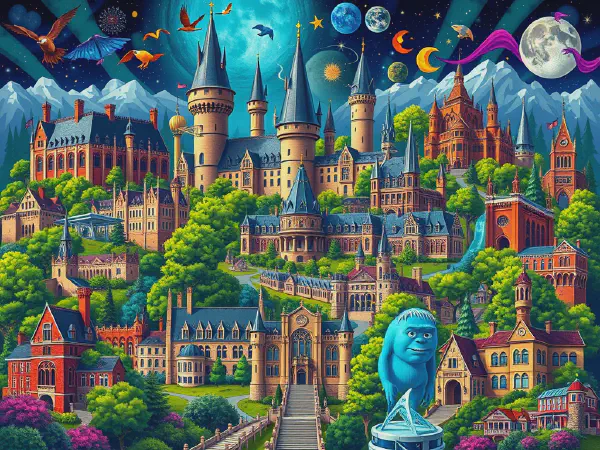Exploring Fictional Universities in Literature and Media: A Deep Dive

Exploring Fictional Universities in Literature and Media
Exploring Fictional Universities in Literature and Media invites readers to dive into the imaginative settings where educational institutions come alive in various narratives. These universities often serve as more than just backdrops; they become integral parts of the story, shaping characters' journeys and reflecting societal themes. From epic fantasy realms to contemporary drama, fictional universities are rich in imagination, offering unique perspectives on the academic experience.
As we embark on this journey of Exploring Fictional Universities in Literature and Media, we find that these institutions frequently embody cultural norms and expectations. They provide a canvas for authors and creators to address real-life issues, such as friendship, rivalry, societal pressures, and personal growth, all woven into the tapestry of academic life. Fictional universities encourage us to reflect on the role of education in our lives and within our societies, often resonating with our experiences or aspirations.
In Exploring Fictional Universities in Literature and Media, notable examples pop up in everything from classic literature to modern television. These narrative spaces allow us to explore diverse genres and themes while simultaneously engaging with the essential elements of education. The allure of these universities lies not just in their settings but also in the rich tapestry of characters and stories they help to craft. Their complexities mirror the intricacies of real-world educational institutions, making them relevant and relatable to audiences.
Moreover, Exploring Fictional Universities in Literature and Media underscores the cultural impact these fictional settings hold. They transcend their narrative purposes, influencing real-world college culture, shaping perceptions of higher education, and even popularizing certain academic stereotypes. Through these representations, audiences gain deeper insights into the experiences of students, faculty, and the overall academic environment in a way that often resonates with their personal realities.
Numerous stories across literature and film showcase the creative possibilities of education at various Fictional Universities.
Ultimately, Exploring Fictional Universities in Literature and Media offers a unique lens through which we can analyze how education is portrayed and experienced across various platforms. As we examine iconic universities, cultural impacts, thematic explorations, and future trends, we discover that these fictional settings provide a powerful commentary on the nature of education itself.
Iconic Fictional Universities
Hogwarts School of Witchcraft and Wizardry stands out as one of the most iconic fictional universities in literature. Created by J.K. Rowling, this magical institution is not just a school; it symbolizes the extraordinary, allowing students to explore complex themes of good vs. evil and friendship. Hogwarts is divided into houses, each representing different values, fostering both rivalry and camaraderie among students, making it a central focus of the Harry Potter series.
Sunnydale High School from Buffy the Vampire Slayer is another noteworthy example, albeit a high school rather than a university. Still, it plays a crucial role in the narrative as a place where supernatural elements collide with everyday teenage life. The school's unique challenges, such as defeating vampires and navigating social rivalries, mirror typical high school experiences while amplifying them through fantasy, creating a strong connection between education and growth.
The University of Metropolis in Supergirl introduces a modern twist to the portrayal of academia. This fictional university features prominently in the lives of its characters, particularly Kara Zor-El, who attempts to balance her academic pursuits with her superhero responsibilities. Aspects of identity exploration and the balance of personal and academic life are central themes presented in the context of university experiences, reflecting contemporary issues faced by students today.
Cultural Impact of Fictional Universities
The influence of fictional universities on real-world college culture is profound. These storied institutions often set benchmarks for social life, academic competitiveness, and personal experiences as they depict heightened versions of college life. For instance, the antics and relationships portrayed in these settings can inspire real-life college traditions, shaping how new generations view their educational experiences.
In addition to shaping college culture, these fictional universities play a significant role in shaping perceptions of education at large. By portraying natural friendships and oppositions, they provide narrative frameworks that help audiences interpret their own educational journeys. The highs and lows depicted may resonate deeply, allowing individuals to connect their personal aspirations to the narrative's outcomes.
Furthermore, fictional universities often popularize academic stereotypes, from the nerdy overachiever to the rebellious dropout. These portrayals can reinforce or challenge societal expectations, offering a complex view of what it means to pursue education. The depiction of students either overcoming or succumbing to these archetypes encourages audiences to engage in conversations about their own academic identities and challenges.
Thematic Exploration in Apparent Universities
In exploring themes of friendship and rivalry, fictional universities present complex relationships that define the educational experience. These interactions can create new narratives, examining how personal connections evolve over academic challenges. Such portrayals mirror real-life dynamics in educational settings, allowing audiences to empathize with characters undergoing similar relationships.
The depiction of academic pressures and challenges also stands out in fictional universities. Characters often grapple with the expectations of success, the fear of failure, and the mental health struggles associated with high-stakes educational environments. These narratives allow for a deeper discussion about the importance of mental health support in educational institutions and the pressures students face.
Additionally, symbolism plays a crucial role in fictional university settings. From architectural designs to the division of classes and houses, every detail contributes to the narrative. For example, Hogwarts' enchanted staircase symbolizes the journey of personal growth—reflecting the characters' evolving identities as they face challenges. This intricate symbolism invites readers and viewers to explore deeper meanings behind the educational experiences depicted.
Representation in Popular Media
Fictional universities shape representation in film and television by providing platforms for diverse storytelling. Series like The Magicians and Community showcase a variety of experiences rooted in academic settings, highlighting issues of inclusivity, personal growth, and self-discovery. This blend of diverse narratives encourages broader social discussions concerning education and identity.
Moreover, video games depict education and university life in innovative ways. Titles like Life is Strange and Persona integrate academic experiences into gameplay, allowing players to navigate social dilemmas and character relationships. These interactive narratives engage audiences on a personal level, creating connections between gameplay and real-life experiences within educational contexts.
The contrast between literature and film portrayals of university experiences often highlights different interpretations of student life. While novels might delve into internal struggles and complex character development, films often present grander narratives, emphasizing visual spectacle and action. Through this lens, we can analyze how medium influences the representation of educational experiences, shaping audience perceptions of the university setting.
Future Trends in University Settings
The emergence of virtual universities in sci-fi narratives presents a fascinating trend in the portrayal of education. As technology evolves, so do the narrative possibilities, allowing creators to envision education in innovative ways, transcending the traditional physical university experience. These stories invite audiences to think critically about the future of learning and the potential of digitally-based education.
The impact of technology on educational representation is continually evolving as well. As creators explore the integration of contemporary tech within narratives, audiences are exposed to familiar and futuristic educational practices, challenging traditional viewpoints on how knowledge is shared and acquired. This evolution reflects the dynamic nature of society and education, shaping our understanding of what it means to be a student in different contexts.
Lastly, the evolution of university tropes in modern literature reveals a shift toward more complex and nuanced depictions of education. Contemporary narratives may unravel traditional stereotypes, offering fresh perspectives that resonate with today's students. By continuing to explore these themes, how universities and education are represented can inform and inspire future generations of thinkers and creators.
